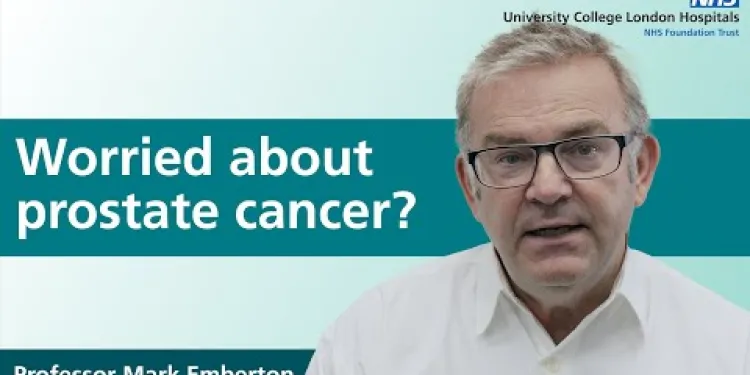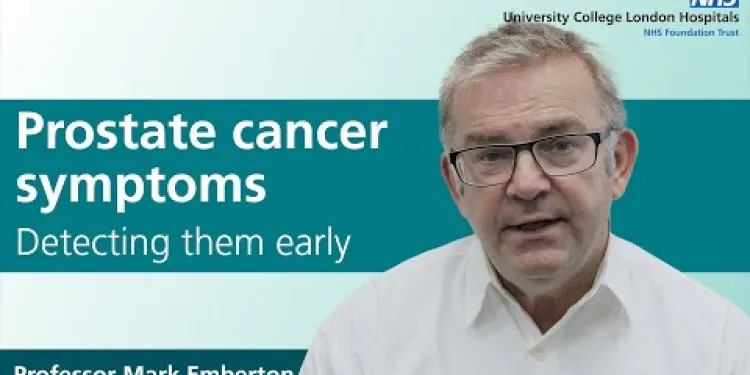Find Help
More Items From Ergsy search
-

What is Prostate Cancer?
Relevance: 100%
-

Treating prostate cancer
Relevance: 100%
-

Living with prostate cancer
Relevance: 99%
-

How is prostate cancer treated?
Relevance: 96%
-

Is BPH the same as prostate cancer?
Relevance: 96%
-

Am I more at risk of prostate cancer?
Relevance: 96%
-

Prostate cancer diagnosis and tests
Relevance: 96%
-

Why do men get prostate cancer?
Relevance: 93%
-

When is chemotherapy used for prostate cancer?
Relevance: 92%
-

Hormone Therapy for prostate cancer
Relevance: 92%
-

Is focal therapy an option for prostate cancer?
Relevance: 91%
-

How is advanced prostate cancer treated?
Relevance: 91%
-

Does Abiraterone cure prostate cancer?
Relevance: 90%
-

What is the role of immunotherapy in prostate cancer treatment?
Relevance: 90%
-

Prostate cancer symptoms - detecting them early
Relevance: 90%
-

Can Abiraterone be used for early-stage prostate cancer?
Relevance: 89%
-

Can prostate cancer recur after treatment?
Relevance: 89%
-

Does BPH increase the risk of prostate cancer?
Relevance: 89%
-

Breakthrough in Cancer Treatment Offers Hope for Prostate Cancer Patients
Relevance: 88%
-

Is there an NHS app for managing prostate cancer care?
Relevance: 88%
-

How does surgery treat prostate cancer?
Relevance: 88%
-

Are there clinical trials available for prostate cancer treatment?
Relevance: 87%
-

What are PSA levels? - Prostate Cancer
Relevance: 87%
-

Can prostate cancer be treated with targeted therapy?
Relevance: 87%
-

Are there online support services for prostate cancer patients on the NHS?
Relevance: 86%
-

Does the NHS offer an online hospital for prostate cancer?
Relevance: 86%
-

What is the purpose of a bone scan in prostate cancer treatment?
Relevance: 86%
-

Are there specific vegetables that are more effective against prostate cancer?
Relevance: 86%
-

What is active surveillance in prostate cancer treatment?
Relevance: 86%
-

How does cryotherapy work in treating prostate cancer?
Relevance: 85%
-

Can lifestyle changes complement prostate cancer treatment?
Relevance: 85%
-

Does the NHS offer an online hospital for prostate cancer?
Relevance: 85%
-

Can I access prostate cancer information online through the NHS?
Relevance: 85%
-

What role do probiotics play in managing prostate cancer?
Relevance: 85%
-

What are the side effects of prostate cancer surgery?
Relevance: 84%
-

What factors determine the treatment plan for prostate cancer?
Relevance: 84%
-

How does hormone therapy help in treating prostate cancer?
Relevance: 84%
-

Can eating vegetables help slow the progression of prostate cancer?
Relevance: 83%
-

Can eating vegetables and probiotics help slow prostate cancer?
Relevance: 83%
-

Where can I find online resources for prostate cancer treatments on the NHS?
Relevance: 83%
Treating prostate cancer involves an approach tailored to the patient's specific condition, considering factors such as the cancer's stage, overall health, and individual preferences. Several treatment options are available, and the choice often depends on the extent and aggressiveness of the cancer:
- Active Surveillance: For low-risk prostate cancer, monitoring the disease without immediate intervention may be an option. Regular check-ups and PSA tests help determine if the cancer is progressing.
- Surgery: Radical prostatectomy involves the removal of the entire prostate gland. This procedure is effective for localized cancers. Robotic-assisted laparoscopic surgery has become increasingly popular due to its precision and quicker recovery times.
- Radiation Therapy: High-energy X-rays or proton beams can target cancer cells while minimizing damage to surrounding tissue. It's a primary treatment option for localized and some advanced cases.
- Hormone Therapy: By lowering testosterone levels, hormone therapy can slow cancer growth or shrink tumors. It's often used in combination with other treatments for more advanced prostate cancer.
- Chemotherapy: Typically reserved for advanced prostate cancer, chemotherapy uses drugs to kill cancer cells or slow their growth.
- Immunotherapy and Targeted Therapies: These innovative treatments harness the body's immune system or target specific cancer cell pathways to inhibit tumor growth and improve survival rates.
Early detection, through regular screenings, significantly improves the chances of successful treatment and long-term survival for prostate cancer patients.
Treating Prostate Cancer in the United Kingdom
Introduction to Prostate Cancer Treatment
Prostate cancer is one of the most common cancers affecting men in the United Kingdom. Early detection and treatment are critical in managing this disease. Treatment options for prostate cancer generally depend on the stage and grade of the cancer, the patient's overall health, and their personal preferences.Active Surveillance
Active surveillance is often recommended for men with low-risk, early-stage prostate cancer. This approach involves regular check-ups, including prostate-specific antigen (PSA) tests, digital rectal exams (DRE), and sometimes biopsies. If the cancer shows signs of progression, more aggressive treatments may be considered.Radiotherapy
Radiotherapy uses high-energy rays to target and kill cancer cells. In the UK, there are two main types of radiotherapy for prostate cancer: external beam radiotherapy (EBRT) and brachytherapy. EBRT directs radiation from outside the body, while brachytherapy involves placing radioactive seeds directly into the prostate. Both treatments are highly effective for localised prostate cancer.Surgery
Radical prostatectomy is a surgical procedure to remove the entire prostate gland and some of the surrounding tissue. This treatment is suitable for men with localized prostate cancer who are in good health and relatively young. In the UK, this surgery can be performed using traditional open surgery or minimally invasive techniques such as laparoscopic or robotic-assisted surgery.Hormone Therapy
Hormone therapy, also known as androgen deprivation therapy (ADT), reduces the levels of male hormones that can stimulate the growth of prostate cancer cells. This treatment is often used for advanced or recurrent prostate cancer. It can be administered through injections, tablets, or sometimes surgery to remove the testicles (orchidectomy).Chemotherapy
Chemotherapy involves the use of drugs to kill rapidly dividing cancer cells. It is typically reserved for advanced prostate cancer that has not responded well to hormone therapy. In the UK, chemotherapy is usually given as an outpatient treatment, allowing patients to continue their daily activities.Clinical Trials and Research
The UK is at the forefront of prostate cancer research, offering patients the opportunity to participate in clinical trials. These trials investigate new treatments and approaches, which can provide access to cutting-edge therapies not yet widely available.Support and Resources
Support is crucial for individuals diagnosed with prostate cancer and their families. Organizations like Prostate Cancer UK provide valuable resources, including support groups, information, and counseling services. The National Health Service (NHS) also offers a range of support services to assist patients throughout their treatment journey. In conclusion, there are multiple treatment options available for prostate cancer in the United Kingdom, tailored to suit individual needs and circumstances. Early detection and appropriate treatment are key to improving outcomes for men with this condition.Treating prostate cancer means finding the best way to help the person. Doctors look at how bad the cancer is, how healthy the person is, and what the person wants. Here are some ways to treat prostate cancer:
- Active Surveillance: For people with a low-risk prostate cancer, doctors might just watch the cancer without any treatment at first. This means having regular doctor visits and PSA tests to see if the cancer is growing.
- Surgery: This is when doctors take out the whole prostate gland. It helps if the cancer is only in the prostate. There is a special surgery using robots that is very precise and helps people get better faster.
- Radiation Therapy: Doctors use strong X-rays or proton beams to kill cancer cells. This helps when the cancer is just in one place or in some cases where it has spread.
- Hormone Therapy: This treatment lowers testosterone in the body. It can help slow down cancer or make tumors smaller. Doctors often use it with other treatments when cancer is more advanced.
- Chemotherapy: This is for when cancer is very advanced. Doctors use strong medicine to kill cancer cells or stop them from growing.
- Immunotherapy and Targeted Therapies: These are new treatments that help the body's own defenses fight cancer or that block cancer cells from growing. They can help people live longer.
Finding prostate cancer early by having regular check-ups makes treatment work better and helps people live longer.
Treating Prostate Cancer in the United Kingdom
About Prostate Cancer Treatment
Prostate cancer is a common cancer in men in the UK. Finding and treating it early is important. The treatment you get depends on how bad the cancer is, your health, and what you prefer.Watchful Waiting
Watchful waiting is for men with early-stage prostate cancer that grows slowly. This means having regular check-ups, like blood tests and exams. If the cancer gets worse, doctors may suggest other treatments.Using Radiation
Radiation uses strong rays to kill cancer cells. In the UK, there are two kinds for prostate cancer. One type, called external beam, sends rays from outside the body. The other, called brachytherapy, puts tiny radioactive seeds inside the prostate. Both work well for cancers that haven't spread.Surgery
Surgery can remove the whole prostate gland. It’s for men whose cancer hasn't spread and who are healthy. In the UK, this can be done with traditional surgery or using special tools that make smaller cuts.Hormone Treatment
Hormone treatment lowers hormones that help cancer grow. This is used for cancers that are advanced or have come back. It can be given as shots, pills, or by surgery to remove the testicles.Using Medicines
Medicine can be used to kill cancer cells that grow quickly. This is usually for cancers that didn’t get better with hormone treatment. In the UK, people often get this treatment without staying in the hospital, so they can keep doing their daily things.Trials and Studies
The UK does many studies to find new ways to treat prostate cancer. People with cancer can join these studies to try new treatments not available to everyone yet.Help and Information
Getting help is important for people with prostate cancer and their families. Groups like Prostate Cancer UK give support and advice. The NHS also has services to help during treatment. To sum up, there are many ways to treat prostate cancer in the UK. Choosing the right one depends on each person’s needs. Finding and treating the cancer early is very important.Frequently Asked Questions
What are the common treatment options for prostate cancer?
Common treatment options include active surveillance, surgery (prostatectomy), radiation therapy, hormone therapy, chemotherapy, and biological therapy.
How is the appropriate treatment for prostate cancer determined?
The appropriate treatment is determined based on the stage of the cancer, the patient's overall health, age, and preferences. A multidisciplinary team of healthcare professionals usually makes this decision in consultation with the patient.
What is active surveillance in the context of prostate cancer?
Active surveillance involves closely monitoring the prostate cancer without active treatment, intervening only if the cancer shows signs of progression. It is often recommended for low-risk, localized prostate cancer.
What are the potential side effects of prostate cancer surgery?
Potential side effects include urinary incontinence, erectile dysfunction, changes in orgasm, and bowel problems. The extent of side effects varies based on the type of surgery and individual patient factors.
Is radiation therapy effective for treating prostate cancer?
Yes, radiation therapy can be very effective for treating prostate cancer, particularly for localized or locally advanced disease. It can be used as a primary treatment or after surgery to eliminate remaining cancer cells.
What is hormone therapy and how does it help in treating prostate cancer?
Hormone therapy, also known as androgen deprivation therapy (ADT), reduces the levels of male hormones (androgens) that can stimulate the growth of prostate cancer cells. It is often used for advanced or recurrent prostate cancer.
Can chemotherapy be used for prostate cancer?
Yes, chemotherapy is an option for advanced prostate cancer, especially if the cancer no longer responds to hormone therapy. It helps to shrink tumors, relieve symptoms, and possibly extend life.
What are the benefits and risks of a prostatectomy?
The benefits of a prostatectomy, such as removing cancer, need to be weighed against risks like infection, blood clots, and potential side effects such as incontinence and erectile dysfunction. Discussing these with a consultant is crucial.
How do clinical trials contribute to prostate cancer treatment?
Clinical trials help in discovering new treatments and improving existing ones. Participation in clinical trials can provide access to cutting-edge therapies and contribute to medical research.
What lifestyle changes can help manage prostate cancer?
Maintaining a healthy diet, staying physically active, managing stress, and avoiding tobacco and excessive alcohol can help manage prostate cancer and improve overall well-being.
What support services are available for prostate cancer patients in the UK?
Support services include counseling, support groups, patient education programs, and resources from organizations like Prostate Cancer UK and Macmillan Cancer Support.
Can prostate cancer recur after treatment?
Yes, prostate cancer can recur after treatment. Regular follow-up appointments and monitoring, often involving PSA blood tests, are important to detect any recurrence early.
What is the role of PSA testing in prostate cancer treatment?
PSA (prostate-specific antigen) testing helps monitor the response to treatment and detect any recurrence of cancer by measuring PSA levels in the blood. High levels can indicate the presence of prostate cancer.
How long does recovery take after prostate cancer treatment?
Recovery time varies depending on the type of treatment. Surgery may require several weeks for full recovery, while other treatments like radiation therapy might have shorter recovery periods. Patients should follow their healthcare provider's guidance for the best outcome.
Is it possible to continue working during prostate cancer treatment?
It is possible to continue working during some types of prostate cancer treatment, such as certain hormone therapies or while under active surveillance. However, treatments like surgery or chemotherapy might require time off work for recovery. Discussing this with your healthcare provider can help plan accordingly.
What are the common ways to treat prostate cancer?
There are different ways to help people with prostate cancer feel better. Here are some common treatments:
- Surgery: This means doctors take out the cancer during an operation.
- Radiation: This uses strong rays to kill cancer cells.
- Hormone Therapy: This treatment stops the cancer from getting the hormones it needs to grow.
- Chemotherapy: This uses special medicine to kill cancer cells.
- Watchful Waiting: Sometimes doctors just keep an eye on the cancer if it is not causing problems.
If you find this hard to read, you can try:
- Asking someone to read it to you.
- Using a computer or tablet to read aloud.
- Looking at pictures or videos about prostate cancer to help understand better.
There are different ways to treat the illness. Here are some options:
- Watching and waiting to see if the illness gets worse.
- Surgery to remove the prostate.
- Using rays of energy to kill cancer cells (radiation therapy).
- Taking medicine to change hormones that cancer needs to grow.
- Using strong medicine to kill cancer cells (chemotherapy).
- Using the body's own defenses to fight cancer (biological therapy).
How do doctors decide the best way to treat prostate cancer?
The right treatment depends on how much the cancer has spread, how healthy the person is, how old they are, and what they want. A team of doctors and nurses helps decide the best treatment, and they talk with the patient about it.
What does watching and waiting mean for prostate cancer?
"Watching and waiting" is when doctors keep a close eye on prostate cancer.
Doctors check the cancer often, but do not treat it right away.
This is for when the cancer is not causing problems.
If the cancer starts to grow, the doctor might decide to treat it.
Tools to help:
- Ask lots of questions to your doctor.
- Keep track of doctor visits in a calendar.
- Use simple notes to write down doctor's advice.
Active surveillance means watching prostate cancer closely without giving any treatment right away. Doctors only give treatment if the cancer starts to grow or get worse. This is usually suggested for prostate cancer that is low-risk and has not spread.
What might happen after prostate cancer surgery?
After surgery for prostate cancer, some things might happen. These are called side effects. Here are some things to know:
- You might have trouble controlling when you pee. This is called incontinence.
- You might find it hard to get or keep an erection. This is called impotence.
- You might feel tired and need more rest.
- You might feel pain or have swelling in the area where the surgery was done.
If you have any questions, you can ask your doctor or nurse. They can help you understand and manage these effects. You might also find it helpful to talk to a support group. They can share ideas and help you feel better.
Sometimes, there are effects that happen after surgery. These effects can be:
- Problems controlling pee
- Trouble getting or keeping an erection
- Changes in how orgasms feel
- Issues with going to the bathroom
How strong these effects are can change. It depends on the kind of surgery and the person's health.
To help understand or manage these effects, people can:
- Talk to their doctor
- Use apps or tools that remind them about medicines
- Join support groups to share experiences
Does radiation therapy help treat prostate cancer?
Radiation therapy uses powerful rays to kill cancer cells. It can be used to treat prostate cancer.
If you or someone you know has prostate cancer, a doctor might suggest radiation therapy as a treatment.
It's important to talk to your doctor to find out if this is the best treatment for you or your loved one.
If you need help understanding, you can use tools like pictures, videos, or ask someone you trust to explain it to you.
Yes, radiation therapy is a strong way to treat prostate cancer. It works well when the cancer is in the prostate or just nearby. It can be the main treatment or used after surgery to get rid of any cancer cells left behind.
What is hormone therapy and how does it help treat prostate cancer?
Hormone therapy is a treatment. It helps people with prostate cancer feel better. It changes the hormones in the body. Hormones are like messengers that tell our bodies what to do.
Prostate cancer can grow when there are certain hormones. Hormone therapy stops these hormones from helping cancer grow. It can slow down the cancer and help people feel stronger.
Talk to your doctor or nurse if you want to know more about it. They can help explain and give you more information.
Hormone treatment, also called ADT, makes the male hormones lower. This stops these hormones from helping prostate cancer grow. We use this treatment when prostate cancer is advanced or comes back.
Can chemotherapy help with prostate cancer?
Chemotherapy is a type of medicine. It is used to fight cancer. Some people with prostate cancer might need chemotherapy.
If you or someone you know has prostate cancer, talk to a doctor. They can help you understand if chemotherapy is the right choice.
It can be helpful to have someone with you during doctor visits. They can help you remember what the doctor says. Writing down notes can also be useful.
Yes, chemotherapy can help people with advanced prostate cancer. If hormone therapy does not work anymore, doctors might use chemotherapy. It can make tumors smaller, help with pain, and might help people live longer.
What are the good and bad things about prostate surgery?
Having an operation to remove the prostate can help get rid of cancer. But, there are things that can go wrong, like infections or blood clots. It can also cause problems like trouble controlling when you pee or problems with getting an erection. It's very important to talk to a doctor about these things.
How do clinical trials help treat prostate cancer?
Clinical trials are studies that test new ways of treating diseases. They help doctors learn if new medicines or treatments are safe and if they work well.
When people with prostate cancer take part in these studies, they help doctors find better ways to treat or even cure the cancer.
Clinical trials are very important. They can lead to new medicines that help more people get better.
If you want to learn more about clinical trials, you can ask your doctor, or visit websites that have easy-to-read information, like Cancer Research UK or Prostate Cancer UK.
Clinical trials are tests to find new ways to help people feel better. Joining a clinical trial lets people try new treatments and helps scientists learn more about medicine.
What can you change in your daily life to help with prostate cancer?
There are things you can do every day to help with prostate cancer. Here are some ideas:
- Eat healthy food: Try to eat lots of fruits and veggies. They are good for you.
- Exercise: Moving your body is important. Try walking or other fun activities.
- Stop smoking: If you smoke, ask for help to stop. Smoking is bad for your health.
- Talk to a doctor: Doctors can give you advice to help you feel better.
It can be helpful to ask someone you trust to support you. They can remind you to do these things.
Eating healthy foods, moving your body, staying calm, not smoking, and drinking less alcohol can help take care of your body and manage prostate cancer.
What help can people with prostate cancer get in the UK?
If you have prostate cancer, you can get help in the UK. Here are some ways to get help:
- Talk to a doctor or nurse. They can help you understand your treatment.
- Join a support group. Meeting others can make you feel less alone.
- Call a helpline. Friendly people can answer your questions.
- Get help from a counselor. Talking can help you feel better.
These services can help you feel supported and informed.
There are people and places that can help you. You can talk to a counselor if you need to. You can join support groups to meet other people with similar problems. There are programs that teach you about your health. You can also get help from groups like Prostate Cancer UK and Macmillan Cancer Support. They have lots of useful information.
Can prostate cancer come back after treatment?
Yes, prostate cancer can come back after treatment.
If you are worried about this, talk to your doctor. They can do tests to check.
You can also try these tools to remember your doctor visits:
- Bring a notepad to write down what the doctor says.
- Ask a family member or friend to come with you.
- Use a voice recorder to record important information, if allowed.
- Ask the doctor to explain things simply or draw pictures.
Yes, prostate cancer can come back after treatment. It is important to have regular check-ups with your doctor. These check-ups can include blood tests called PSA tests. They help find out if the cancer is back.
What does a PSA test do for prostate cancer treatment?
A PSA test helps doctors find out if you have prostate cancer. It looks for a special thing in your blood called PSA.
If the PSA number is high, it might mean you have prostate cancer. The doctor will explain what comes next. You might need more tests or visits to the doctor.
To understand more about PSA tests, you can:
- Ask your doctor to explain.
- Use pictures and videos to learn more.
- Talk to someone who had the test before.
PSA testing checks how well treatment for prostate cancer is working. It also helps see if cancer comes back. It does this by measuring PSA levels in your blood. High PSA levels might mean cancer is in the prostate.
If reading is hard, you can use tools that read text out loud. It's also helpful to read with a friend or family member.
How long does it take to feel better after prostate cancer treatment?
Getting better after prostate cancer treatment can take time. Everyone is different, so it may take weeks or months.
Here are some tips to help you feel better:
- Rest lots and get good sleep.
- Ask someone to help with work and chores.
- Eat healthy foods and drink plenty of water.
- Talk to your doctor for advice and check-ups.
- Stay positive and be patient with yourself.
How long it takes to get better depends on what kind of treatment you have. If you have surgery, it might take a few weeks to feel all better. But if you have something like radiation therapy, it might take less time. Listen to your doctor to know what to do to feel better faster.
Can I keep working when I am getting treatment for prostate cancer?
You might be able to keep working during some prostate cancer treatments. For example, with some hormone treatments, you can still work. If your doctor is just watching your cancer (this is called active surveillance), you might not need time off work.
Sometimes, you need a break from work. This can happen if you have surgery or chemotherapy because you need time to get better.
Talk to your doctor about your work. They can help you make a plan.
Useful Links
This website offers general information and is not a substitute for professional advice.
Always seek guidance from qualified professionals.
If you have any medical concerns or need urgent help, contact a healthcare professional or emergency services immediately.
- Ergsy carfully checks the information in the videos we provide here.
- Videos shown by Youtube after a video has completed, have NOT been reviewed by ERGSY.
- To view, click the arrow in centre of video.
- Most of the videos you find here will have subtitles and/or closed captions available.
- You may need to turn these on, and choose your preferred language.
- Go to the video you'd like to watch.
- If closed captions (CC) are available, settings will be visible on the bottom right of the video player.
- To turn on Captions, click settings .
- To turn off Captions, click settings again.
More Items From Ergsy search
-

What is Prostate Cancer?
Relevance: 100%
-

Treating prostate cancer
Relevance: 100%
-

Living with prostate cancer
Relevance: 99%
-

How is prostate cancer treated?
Relevance: 96%
-

Is BPH the same as prostate cancer?
Relevance: 96%
-

Am I more at risk of prostate cancer?
Relevance: 96%
-

Prostate cancer diagnosis and tests
Relevance: 96%
-

Why do men get prostate cancer?
Relevance: 93%
-

When is chemotherapy used for prostate cancer?
Relevance: 92%
-

Hormone Therapy for prostate cancer
Relevance: 92%
-

Is focal therapy an option for prostate cancer?
Relevance: 91%
-

How is advanced prostate cancer treated?
Relevance: 91%
-

Does Abiraterone cure prostate cancer?
Relevance: 90%
-

What is the role of immunotherapy in prostate cancer treatment?
Relevance: 90%
-

Prostate cancer symptoms - detecting them early
Relevance: 90%
-

Can Abiraterone be used for early-stage prostate cancer?
Relevance: 89%
-

Can prostate cancer recur after treatment?
Relevance: 89%
-

Does BPH increase the risk of prostate cancer?
Relevance: 89%
-

Breakthrough in Cancer Treatment Offers Hope for Prostate Cancer Patients
Relevance: 88%
-

Is there an NHS app for managing prostate cancer care?
Relevance: 88%
-

How does surgery treat prostate cancer?
Relevance: 88%
-

Are there clinical trials available for prostate cancer treatment?
Relevance: 87%
-

What are PSA levels? - Prostate Cancer
Relevance: 87%
-

Can prostate cancer be treated with targeted therapy?
Relevance: 87%
-

Are there online support services for prostate cancer patients on the NHS?
Relevance: 86%
-

Does the NHS offer an online hospital for prostate cancer?
Relevance: 86%
-

What is the purpose of a bone scan in prostate cancer treatment?
Relevance: 86%
-

Are there specific vegetables that are more effective against prostate cancer?
Relevance: 86%
-

What is active surveillance in prostate cancer treatment?
Relevance: 86%
-

How does cryotherapy work in treating prostate cancer?
Relevance: 85%
-

Can lifestyle changes complement prostate cancer treatment?
Relevance: 85%
-

Does the NHS offer an online hospital for prostate cancer?
Relevance: 85%
-

Can I access prostate cancer information online through the NHS?
Relevance: 85%
-

What role do probiotics play in managing prostate cancer?
Relevance: 85%
-

What are the side effects of prostate cancer surgery?
Relevance: 84%
-

What factors determine the treatment plan for prostate cancer?
Relevance: 84%
-

How does hormone therapy help in treating prostate cancer?
Relevance: 84%
-

Can eating vegetables help slow the progression of prostate cancer?
Relevance: 83%
-

Can eating vegetables and probiotics help slow prostate cancer?
Relevance: 83%
-

Where can I find online resources for prostate cancer treatments on the NHS?
Relevance: 83%


